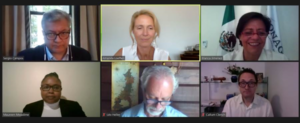
Answers to Q&A from Panellists
As of July 2020, ten years have passed since human rights to water and sanitation were recognised by the United Nations General Assembly. Whilst notable progress has been made in this time, for example, at least 10 countries have altered their legislation to include these rights into their constitution, there is still much more to be done. A large proportion of countries around the globe continue to struggle to ensure full access of safe and sustainable drinking water and sanitation, especially for their marginalised members of society.
In celebration of this significant milestone, in coordination with the UN Special Rapporteur on the human rights to safe drinking water and sanitation, Human Right 2 Water hosted its second webinar this week, bringing together perspectives from a range of water and sanitation experts from Mexico (CONAGUA), Kenya (the Kenya National Commission on Human Rights), the Inter-American Development Bank, and the International Water Resources Association.
The focus of the webinar surrounded the importance of recognising the human rights to water and sanitation in law and policy, particularly if we hope to achieve Sustainable Development Goals 6.1 and 6.2. Human Right 2 Water’s Chief Executive, Amanda Loeffen, reflected on the urgency of the situation when she noted that “Less than 30 countries in the world have explicitly recognised the Human right to water in their constitutions, and that is merely a first step”
Millions of people globally still are left without the basic facilities to allow them the simple act of washing hands to be able to protect themselves again infections such as COVID. It is crises like these that pinpoint the imperative need to make change. As remarked by Secretary of the board and Executive Director of IWRA, Callum Clench, “One of the clear messages that has come out of the COVID crisis is that it has exacerbated the pre-existing need to realise the human right to water and sanitation for minimum hygiene, such as washing hands.”
There has been progress in some countries, particularly where governments have embraced the need for reform of national water programmes. Under the jurisdiction of Dr Blanca Jimenez, Director General of the National Water Commission, CONAGUA, “Mexico has introduced a new decree to ensure that every person has access to at least 100 litres of water per day”. Dr Jimenez mentioned that there are 7 million people (in Mexico) without access to a normal water service…many because they cannot afford the energy cost. The government response has been to reform policy to make water more affordable for vulnerable people, increasing subsidies from 50 to 90% for some people.
Latin America, as a region, is already impacted with water infrastructure vulnerable to climate change, and inefficient systems. According to Sergio Campos, Water and Sanitation Division Chief at the Inter-American Development Bank, “almost 50% of the water produced is lost” in the delivery systems in Latin America, making inefficient infrastructure for water and sanitation a further impediment to water availability. Sergio also recognised the progress that has been made, as 16 countries in the region have acknowledged the Human Right to Water.
Turning to the African continent, Kenya leads the field by implementing a framework for monitoring the realisation of the human rights to water and sanitation, jointly developed in 2017 by the Kenya National Commission of Human Rights and others. Maureen Mwadime, Senior Human Rights Officer at KNCHR supported this need for intervention with the concerning statistics that “only 59% of Kenyans have access to basic water services, and 29% to basic sanitation[1]”. Her presentation can be found here.
Léo Heller, UN Special Rapporteur on the human rights to safe drinking water and sanitation, helped to bring focus on some of the progress that has been made in the last 10 years. He explained how he has followed up in countries where there have been missions, to see where recommendations have been followed. He particularly mentioned Portugal and El-Salvador where there has been some interesting progress. For example, Portugal has recently included initiatives to improve affordable services to people living in poverty as a result.
Affordability was a subject that came up several times in the questions. Speaking directly about affordability, one of the criteria of these human rights, he summarised some of the approaches that can be developed (and referenced in his report). Importantly, he emphasised “the need for progressive realisation of the right, and the need for countries to maintain this effort”.

[1] WASH Joint Monitoring Programme, 2019
250 Registrants and attendees joined us from all over the globe, including the Americas, Africa and Asia.
For those of you who were unable to join, a recording of the webinar is available.
Our webinar for next month, dealing with People-First PPPs, and the integration of a human rights-based approach to scale up SDG 6 will be held on 5th August with further details to be announced shortly.

